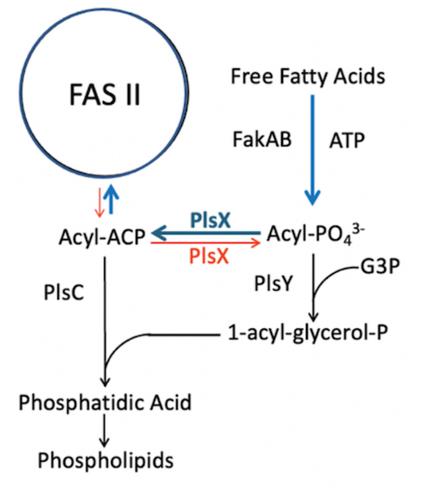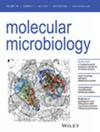The Enteric Bacterium Enterococcus faecalis Elongates and Incorporates Exogenous Short and Medium Chain Fatty Acids Into Membrane Lipids
IF 2.6
2区 生物学
Q3 BIOCHEMISTRY & MOLECULAR BIOLOGY
引用次数: 0
Abstract
Enterococcus faecalis incorporates and elongates exogeneous short- and medium-chain fatty acids to chains sufficiently long to enter membrane phospholipid synthesis. The acids are activated by the E. faecalis fatty acid kinase (FakAB) system and converted to acyl-ACP species that can enter the fatty acid synthesis cycle to become elongated. Following elongation the acyl chains are incorporated into phospholipid by the PlsY and PlsC acyltranferases. This process has little effect on de novo fatty acid synthesis in the case of short-chain acids, but a greater effect with medium-chain acids. Incorporation of exogenous short-chain fatty acids in E. faecalis was greatly increased by overexpression of either AcpA, the acyl carrier protein of fatty acid synthesis, or the phosphate acyl transferase PlsX. The PlsX of Lactococcus lactis was markedly superior to the E. faecalis PlsX in incorporation of short-chain but not long-chain acids. These manipulations also allowed unsaturated fatty acids of lengths too short for direct transfer to the phospholipid synthesis pathway to be elongated and support growth of E. faecalis unsaturated fatty acid auxotrophic strains. Short- and medium-chain fatty acids can be abundant in the human gastrointestinal tract and their elongation by E. faecalis would conserve energy and carbon by relieving the requirement for total de novo synthesis of phospholipid acyl chains.

肠道细菌粪肠球菌拉长外源短链和中链脂肪酸并将其纳入膜脂中
粪肠球菌将外来的短链和中链脂肪酸结合并拉长至足够长的链,以进入膜磷脂合成。这些脂肪酸被粪肠球菌脂肪酸激酶(FakAB)系统激活,并转化为可进入脂肪酸合成循环的酰基-ACP 物种,使其变长。伸长后,酰基链通过 PlsY 和 PlsC酰基转化酶与磷脂结合。这一过程对短链脂肪酸的从头合成影响很小,但对中链脂肪酸的影响较大。通过过量表达脂肪酸合成的酰基载体蛋白 AcpA 或磷酸酰基转移酶 PlsX,粪肠球菌中外源短链脂肪酸的掺入量大大增加。在结合短链酸而非长链酸方面,乳酸乳球菌的 PlsX 明显优于粪肠球菌的 PlsX。这些操作还允许长度太短、无法直接转移到磷脂合成途径的不饱和脂肪酸被拉长,并支持粪肠球菌不饱和脂肪酸辅助菌株的生长。中短链脂肪酸在人体胃肠道中含量丰富,粪肠球菌拉长中短链脂肪酸可以缓解磷脂酰基链从头合成的需要,从而节省能量和碳。
本文章由计算机程序翻译,如有差异,请以英文原文为准。
求助全文
约1分钟内获得全文
求助全文
来源期刊

Molecular Microbiology
生物-生化与分子生物学
CiteScore
7.20
自引率
5.60%
发文量
132
审稿时长
1.7 months
期刊介绍:
Molecular Microbiology, the leading primary journal in the microbial sciences, publishes molecular studies of Bacteria, Archaea, eukaryotic microorganisms, and their viruses.
Research papers should lead to a deeper understanding of the molecular principles underlying basic physiological processes or mechanisms. Appropriate topics include gene expression and regulation, pathogenicity and virulence, physiology and metabolism, synthesis of macromolecules (proteins, nucleic acids, lipids, polysaccharides, etc), cell biology and subcellular organization, membrane biogenesis and function, traffic and transport, cell-cell communication and signalling pathways, evolution and gene transfer. Articles focused on host responses (cellular or immunological) to pathogens or on microbial ecology should be directed to our sister journals Cellular Microbiology and Environmental Microbiology, respectively.
 求助内容:
求助内容: 应助结果提醒方式:
应助结果提醒方式:


